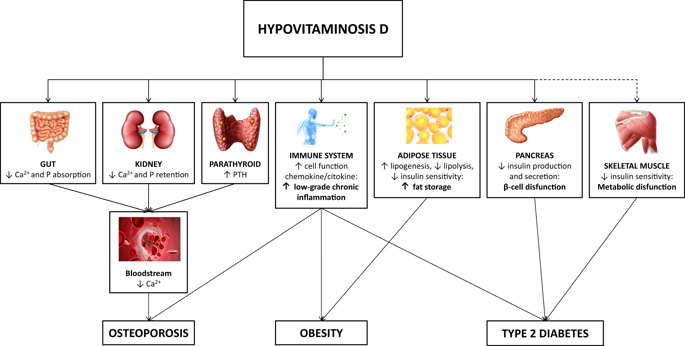International Journal of Obesity Supplements Pub Date : 2019-04-12 , DOI: 10.1038/s41367-019-0010-8 Silvia Migliaccio , , Andrea Di Nisio , Chiara Mele , Lorenzo Scappaticcio , Silvia Savastano , Annamaria Colao

|
Epidemiological studies reported that vitamin D deficiency represents an increasingly widespread phenomenon in various populations. Vitamin D deficiency is considered a clinical syndrome determined by low circulating levels of 25-hydroxyvitamin D (25(OH)D), which is the biologically-inactive intermediate and represents the predominant circulating form. Different mechanisms have been hypothesized to explain the association between hypovitaminosis D and obesity, including lower dietary intake of vitamin D, lesser skin exposure to sunlight, due to less outdoor physical activity, decreased intestinal absorption, impaired hydroxylation in adipose tissue and 25(OH)D accumulation in fat. However, several studies speculated that vitamin D deficiency itself could cause obesity or prevent weight loss. The fat-solubility of vitamin D leads to the hypothesis that a sequestration process occurs in body fat depots, resulting in a lower bioavailability in the obese state. After investigating the clinical aspects of vitamin D deficiency and the proposed mechanisms for low 25(OH)D in obesity, in this manuscript we discuss the possible role of vitamin D replacement treatment, with different formulations, to restore normal levels in individuals affected by obesity, and evaluate potential positive effects on obesity itself and its metabolic consequences. Food-based prevention strategies for enhancement of vitamin D status and, therefore, lowering skeletal and extra-skeletal diseases risk have been widely proposed in the past decades; however pharmacological supplementation, namely cholecalciferol and calcifediol, is required in the treatment of vitamin D insufficiency and its comorbidities. In individuals affected by obesity, high doses of vitamin D are required to normalize serum vitamin D levels, but the different liposolubility of different supplements should be taken into account. Although the results are inconsistent, some studies reported that vitamin D supplementation may have some beneficial effects in people with obesity.
中文翻译:

肥胖和维生素缺乏症D:是因果还是伤亡?
流行病学研究报告说,维生素D缺乏症在各种人群中代表着越来越普遍的现象。维生素D缺乏症被认为是由25-羟基维生素D(25(OH)D)的低循环水平决定的临床综合征,25-羟基维生素D(25(OH)D)是无生物学活性的中间体,代表主要的循环形式。假设有不同的机制来解释维生素D缺乏与肥胖之间的关系,包括饮食中维生素D的摄入量减少,由于户外体育活动较少,皮肤接触阳光较少,肠道吸收减少,脂肪组织中的羟基化受损和25(OH) D堆积在脂肪中。但是,一些研究推测维生素D缺乏症本身可能导致肥胖或防止体重减轻。维生素D的脂溶性导致以下假设:在人体脂肪储库中发生螯合过程,从而导致肥胖状态下的生物利用度降低。在调查了维生素D缺乏症的临床方面以及提出的肥胖症中25(OH)D偏低的机理后,在本手稿中,我们讨论了维生素D替代疗法(采用不同的配方)在恢复肥胖症患者体内恢复正常水平方面的可能作用。 ,并评估对肥胖症本身及其代谢后果的潜在积极影响。在过去的几十年中,广泛提出了以食物为基础的预防策略,以提高维生素D的状况,从而降低骨骼和骨骼外疾病的风险。但是,药理补品,即胆钙化固醇和降钙糖醇,是治疗维生素D功能不全及其合并症所必需的。在受肥胖影响的个体中,需要高剂量的维生素D以使血清维生素D水平正常化,但应考虑不同补充剂的不同脂溶性。尽管结果不一致,但一些研究报告称补充维生素D对肥胖者可能有一些有益的作用。






























 京公网安备 11010802027423号
京公网安备 11010802027423号